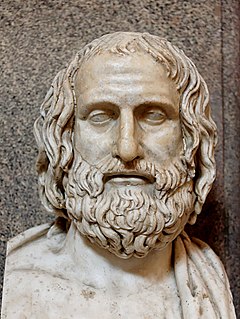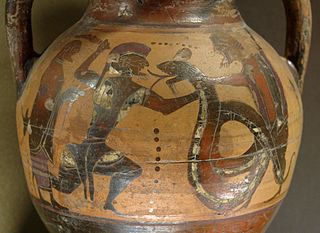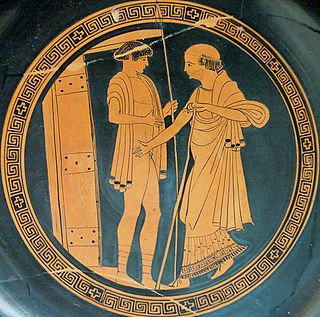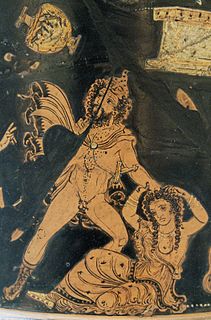
Aeschylus was an ancient Greek tragedian. He is often described as the father of tragedy. Academics' knowledge of the genre begins with his work, and understanding of earlier tragedies is largely based on inferences from his surviving plays. According to Aristotle, he expanded the number of characters in the theater and allowed conflict among them; characters previously had interacted only with the chorus.

Euripides was a tragedian of classical Athens. Along with Aeschylus and Sophocles, he is one of the three ancient Greek tragedians for whom a significant number of plays have survived. Some ancient scholars attributed 95 plays to him but, according to the Suda, it was 92 at most. Of these, 18 or 19 have survived more or less complete and there are also fragments, some substantial, of most of the other plays. More of his plays have survived intact than those of Aeschylus and Sophocles together, partly because his popularity grew as theirs declined—he became, in the Hellenistic Age, a cornerstone of ancient literary education, along with Homer, Demosthenes, and Menander.

Sophocles is one of three ancient Greek tragedians whose plays have survived. His first plays were written later than or contemporary with those of Aeschylus, and earlier than or contemporary with those of Euripides. Sophocles wrote over 120 plays during the course of his life, but only seven have survived in a complete form: Ajax, Antigone, Women of Trachis, Oedipus Rex, Electra, Philoctetes and Oedipus at Colonus. For almost 50 years, Sophocles was the most celebrated playwright in the dramatic competitions of the city-state of Athens that took place during the religious festivals of the Lenaea and the Dionysia. He competed in 30 competitions, won 24, and was never judged lower than second place. Aeschylus won 13 competitions, and was sometimes defeated by Sophocles, while Euripides won four competitions.

Thrace is a geographical and historical region in Southeast Europe, now split between Bulgaria, Greece and Turkey, which is bounded by the Balkan Mountains to the north, the Aegean Sea to the south and the Black Sea to the east. It comprises southeastern Bulgaria, northeastern Greece and the European part of Turkey.

Dionysus is the god of the grape-harvest, winemaking and wine, of fertility, ritual madness, religious ecstasy, and theatre in ancient Greek religion and myth. Wine played an important role in Greek culture, and the cult of Dionysus was the main religious focus for its unrestrained consumption. His worship became firmly established in the seventh century BC. He may have been worshipped as early as c. 1500–1100 BC by Mycenaean Greeks; traces of Dionysian-type cult have also been found in ancient Minoan Crete. His origins are uncertain, and his cults took many forms; some are described by ancient sources as Thracian, others as Greek. In some cults, he arrives from the east, as an Asiatic foreigner; in others, from Ethiopia in the South. Some scholars believe that Dionysus is a syncretism of a local Greek nature deity and a more powerful god from Thrace or Phrygia such as Sabazios or Zalmoxis. He is a god of epiphany, "the god that comes", and his "foreignness" as an arriving outsider-god may be inherent and essential to his cults. He is a major, popular figure of Greek mythology and religion, becoming increasingly important over time, and included in some lists of the twelve Olympians, as the last of their number, and the only god born from a mortal mother. His festivals were the driving force behind the development of Greek theatre.
In ancient Greek religion and mythology, Zagreus was sometimes identified with a god worshipped by the followers of Orphism, the “first Dionysus”, a son of Zeus and Persephone, who was dismembered by the Titans and reborn. However, in the earliest mention of Zagreus, he is paired with Gaia (Earth) and called the “highest” god [of the underworld?] and Aeschylus links Zagreus with Hades, possibly as Hades' son, or Hades himself. Noting "Hades' identity as Zeus' katachthonios alter ego", Timothy Gantz thought it "likely" that Zagreus, originally, perhaps the son of Hades and Persephone, later merged with the Orphic Dionysus, the son of Zeus and Persephone.

The Thracians were a group of Indo-European tribes inhabiting a large area in Eastern and Southeastern Europe. They spoke the Thracian language – a scarcely attested branch of the Indo-European language family. The study of Thracians and Thracian culture is known as Thracology.

Prometheus Bound is an Ancient Greek tragedy. In antiquity, it was attributed to Aeschylus, but now is considered by some scholars to be the work of another hand, and perhaps one as late as c. 430 BC. Despite these doubts about its authorship, the play's designation as Aeschylean has remained conventional. The tragedy is based on the myth of Prometheus, a Titan who defies the gods and gives fire to mankind, acts for which he is subjected to perpetual punishment.

The Satrae were, in ancient geography, a Thracian people, inhabiting part of Mount Pangaeus between the rivers Nestus (Mesta) and Strymon (Struma).
Greek tragedy is a form of theatre from Ancient Greece and Asia Minor. It reached its most significant form in Athens in the 5th century BC, the works of which are sometimes called Attic tragedy. Greek tragedy is widely believed to be an extension of the ancient rites carried out in honor of Dionysus, and it heavily influenced the theatre of Ancient Rome and the Renaissance. Tragic plots were most often based upon myths from the oral traditions of archaic epics. In tragic theatre, however, these narratives were presented by actors. The most acclaimed Greek tragedians are Aeschylus, Sophocles and Euripides.

The Achilleis is a lost trilogy by the Athenian dramatist Aeschylus. The three plays that make up the Achilleis exist today only in fragments, but aspects of their overall content can be reconstructed with reasonable certainty. Like the Oresteia which forms "a narratively connected unit with a continuous plot," the trilogy had a unified focus, presumably treating the story of Achilles at Troy in a version comparable to the plot of the latter two-thirds of the Iliad. In the Myrmidons, Achilles' refusal to fight after his quarrel with Agamemnon led to the death of Patroclus. The title of the play traditionally placed second in the trilogy is the Nereids. The chorus was thus a group of Nereids, and the subject of the play involved Achilles and his Nereid mother Thetis, probably her mourning his imminent death and the acquisition of his new arms. In the Phrygians or Ransom of Hector, Priam and a chorus of Phrygians sought to retrieve Hector's body from the still wroth Achilles.

In Greek mythology, Lycurgus was the king of the Edoni in Thrace, son of Dryas, the "oak", and father of a son whose name was also Dryas.

Satyr plays were an ancient Greek form of tragicomedy, similar in spirit to the bawdy satire of burlesque. They featured choruses of satyrs, were based on Greek mythology, and were rife with mock drunkenness, brazen sexuality, pranks, sight gags, and general merriment.

The Edoni were a Thracian people who dwelt mostly between the Nestus and the Strymon rivers in southern Thrace, but also once dwelt west of the Strymon at least as far as the Axios. They inhabited the region of Mygdonia before the Macedonians drove them out. After that, they settled in the region of Edonis which was named after them. There were a number of Edonian cities in the Classical era, including Drabeskos and Myrkinos.

The Suppliants, also called The Suppliant Maidens, or The Suppliant Women, is a play by Aeschylus. It was probably first performed sometime after 470 BC as the first play in a tetralogy, sometimes referred to as the Danaid Tetralogy, which probably included the lost plays The Egyptians, and The Daughters of Danaus, and the satyr play Amymone. It was long thought to be the earliest surviving play by Aeschylus due to the relatively anachronistic function of the chorus as the protagonist of the drama. However, evidence discovered in the mid-20th century shows it one of Aeschylus' last plays, definitely after The Persians and possibly after Seven Against Thebes.
Cyclops is an ancient Greek satyr play by Euripides. This satyr play would be the fourth part of the Euripides' tetralogy, performed for the dramatic festival of 5th Century B.C. Athens. A satyr play was a story usually taken from epic poetry or mythology, and then adorned with a chorus of satyrs.
Theristai, is a lost satyr play by Attic playwright Euripides. It was initially performed at the Dionysia in Athens in 431 BCE along with the tragedies Medea, Philoctetes and Dictys. The tetralogy finished in 3rd place, behind tetralogies by Euphorion, who won 1st prize, and Sophocles.

Philoctetes is a tragedy by the Athenian poet Euripides. It was probably first produced in 431 BCE at the Dionysia in a tetralogy that included the extant Medea and was awarded third prize. It is now lost except for a few fragments. Much of what we know of the plot is from the writings of Dio Chrysostom, who compared the Philoctetes plays of Aeschylus, Euripides and Sophocles and also paraphrased the beginning of Euripides' play.
The Kabeiroi, also known as Cabeiroi and Cabeiri, is an ancient Greek tragedy by Aeschylus which survives in three fragments. It was written between 499 and 456BC, and appears to have featured Jason and the Argonauts arriving on the island of Lemnos and being initiated into the mystery cult of the Kabeiroi. The title refers to the play's chorus, who were local chthonic deities associated with mystery religion and often considered to be sons or grandsons of Hephaistos. Lemnos was the location for a cult of the Kabeiroi from the sixth century BC onwards, and archaeological excavations confirm that initiation rites occurred there.
In Greek mythology, Lycurgus, also Lykurgos or Lykourgos, may refer to the following individuals:















